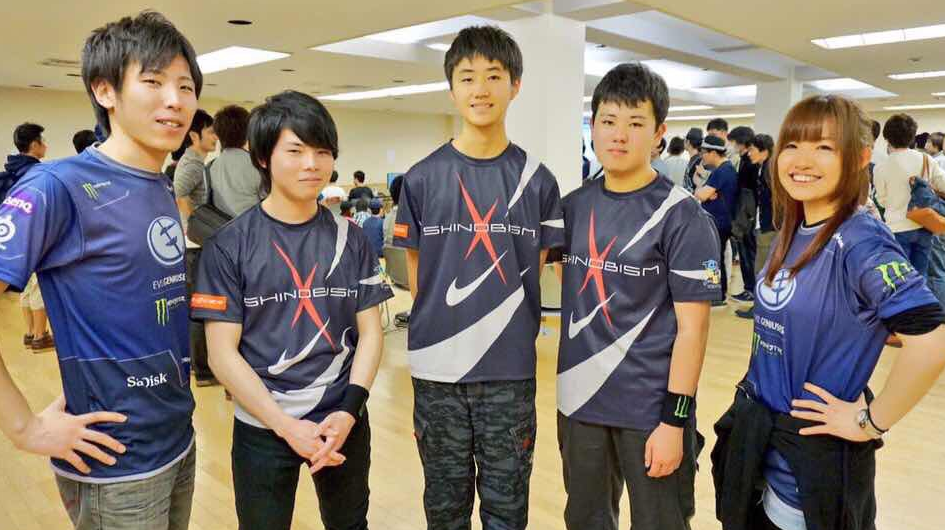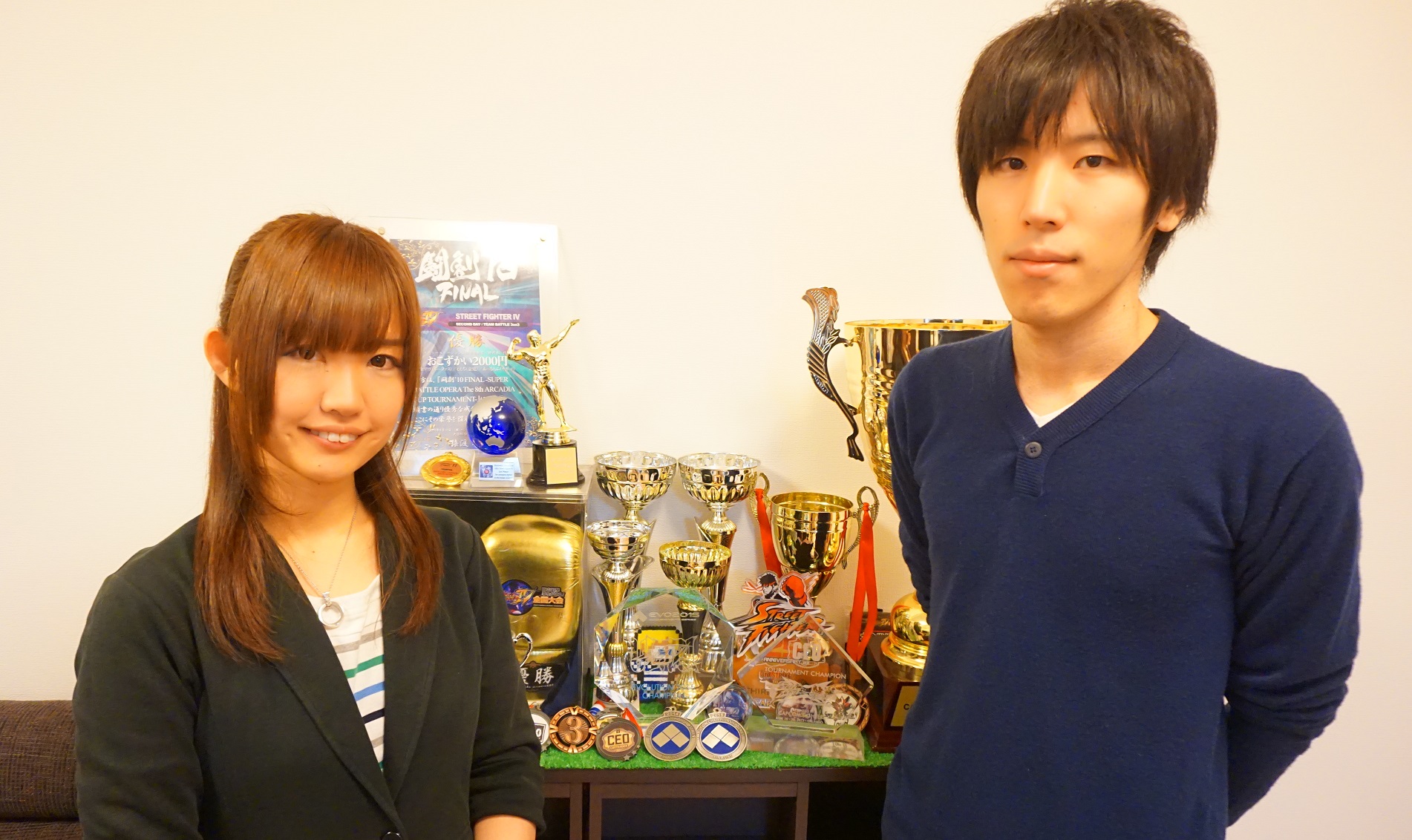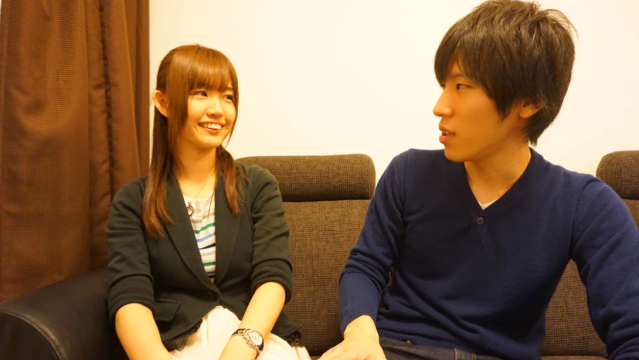When I called Street Fighter pro Yuko “Chocoblanka” Momochi at 11 a.m. Japan time, her husband, the legendary Street Fighter champion Yusuke Momochi, was asleep. The husband-wife team, both Street Fighter athletes, had recently launched a school to train promising Japanese competitors. They have rented out a studio to use as a casual sort of classroom. They’re running streams to rekindle interest among Japanese competitors. Yuko handles the logistics and business strategy, explaining that Momochi’s schedule was now a cycle of sleep and Street Fighter. Right then, he was in the former portion of his day.
Yuko “Chocoblanka” Momochi and her husband, Yusuke Momochi
“He just wakes up and plays Street Fighter,” she told me. “When the students come, of course, he wakes up and teaches them.” The task of executing the husband-wife team’s vision for Japan’s next generation of Street Fighter champions is on Yuko’s shoulders.
Their enterprise is called Shinobism. It is Yuko and Momochi’s attempt to breath life into Japan’s deteriorating Street Fighter scene. Although the prowess of Daigo Umehara, Ai Keita, Tatsuya Haitani and Hajime Taniguchi has brought international renown to Japan’s Street Fighter community, Street Fighter V‘s future in Japan is uncertain. Japan’s international Street Fighter titan, Daigo Umehara, has over the last year lost his edge, something he’s attributed to Street Fighter V‘s departure from tradition. Without an arcade presence, the game’s current iteration is a harder sell for Japanese players who’d patronized the gaming hubs daily to grind out Street Fighter IV combos. On top of that, Street Fighter V, released in 2015, is widely considered less popular than its previous iteration. Enthusiasts complain that its competitive scene lacks vigour.
Yuko and Momochi founded Shinobism in 2015 with the lofty goal of nurturing new, fierce Japanese players who would earn Street Fighter V trophies abroad. “America has NuckleDu and other young players,” Yuko said. “In Japan, there aren’t that many.” Some Street Fighter IV veterans are hitting 30, Yuko explains, which in fighting game years, is much older. “I realised, if we don’t start training some new, young blood, Japanese fighting games will be in a bad place. They could die,” Yuko said.

Yuko, Momochi and their students at Evo 2016 (via Twitter)
Before Street Fighter IV, Yuko hadn’t played another fighting game. In 2008, when Capcom released it, Yuko was studying the automotive industry at her local university. The day Street Fighter IV launched in Japan, a friend dragged her to an arcade in Nagoya to give the then-20-year-old franchise’s newest iteration a spin. “Actually,” she confided, “I was very awful. I couldn’t even do a Shoryuken,” Street Fighter‘s term for a jumping uppercut punch. Her friend picked it up in moments. Yuko watched him, interested, and decided that she wanted get very good at this game. Every day, she says, she made her pilgrimage to the arcade.
Yuko dipped her toe in with franchise protagonist Ryu, but didn’t jive with his moveset. It was her introduction to Blanka, the green, hulking monster who debuted in Street Fighter II, that persuaded her to stick with Street Fighter. He’s famously easy to pick up and feels frenetic, with a sort of animal ferality. Blanka distances enemies with his superior movement speed and longer range, but his attacks thrive on chaos and unpredictability. Yuko found herself quickly drawn to play him. Soon, she was hooked on Street Fighter IV.
“I got a job at the arcade I was practicing at,” Yuko recalled. It was part-time, on top of her degree. There, she attended tournaments, which attracted Nagoya’s top Street Fighter IV players, often ones who’d cut their teeth on any of the game’s previous iterations. Patiently, Yuko mastered Blanka’s techniques one by one until she felt comfortable competing at tournaments. It was, she recalled, very difficult. Support was thin. Her one friend encouraged her to hone her Blanka, but all around her, the community was more standoffish. When they weren’t, veteran Street Fighter IV players would pull her aside and give her advice. She attributes that to her gender.
“Because I was a girl, it was more difficult, but also because I was a girl, some things were easier for me,” she said.

Yuko and Momochi
At one of these tournaments, Yuko met Momochi. Yuko watch as Momochi cooly defeated his opponents, not talking much at all. A year had passed since she picked up Street Fighter IV, and she recognised Momochi’s talent. It proved magnetic. They began attending tournaments together, where, Yuko says, she was in turns trash-talked and praised because of her connection to the rising Street Fighter champion, who would go on to win 2014’s Capcom Cup and 2015’s Evo tournaments. “I really liked Street Fighter, so I didn’t care much,” Yuko said. “I just decided to keep continuing.”
In 2011, the couple signed on with Evil Geniuses, a San Francisco-based esports organisation. In 2015, the same year Momochi proposed, Street Fighter V came out without Blanka on its roster. After rising to peak Street Fighter fame, Momochi was eliminated from Evo 2016’s Street Fighter V pools before the top 32. Momochi still competes, but not with the same vigour or consistency with which he approached Street Fighter IV. In January, 2017, Yuko and her husband moved over to another California-based team, Echo Fox.
Street Fighter is still the gravitational center of Yuko’s life, even though her beloved Blanka is no longer current. Her wisdom about the industry, and the grit with which she climbed it, translates, even if Blanka is a thing of the past. Along with Momochi, Yuko now trains three students, and is in the process of getting another. Some travel over an hour to learn at the studio she rents out for Shinobism’s school. They collect no money from the students. Momochi’s Capcom Cup winnings, $US30,000 ($38,917) in 2014, fund the operation. Mostly, it’s Momochi battling the Street Fighter youth, sharpening their reflexes and strengthening their strategies.
Earlier this month, M. Bison player Haku, Momochi’s 15-year-old student, said he wasn’t even sure whether Street Fighter V would last through 2017.
Although she’s helping raise Japan’s next class of fighting games players, Yuko too is pessimistic about Japan’s Street Fighter future. In recent blog posts, Yuko explains that Japan’s esports infrastructure is woefully weak compared to America’s. She points to American food and beverage manufacturers’ willingness to sponsor esports competitors, compared to Japan, where epsorts leans on the video game peripheral industry. Also, it’s MOBAs like League of Legends that turn heads for Japanese investors. There’s less faith in the financial viability of Street Fighter champions, she says.
So, she’s hellbent on getting her students international face time. Some might consider it a betrayal to her country. She thinks it’s an effective business strategy, and maybe, the only option for promising champions like Haku. Last year, she and Momochi brought their three students, Haku, Johnny and Yamaguchi, out to EVO in Las Vegas. All of them won their pools.
Yuko is raising Shinobism’s students out in the open, where American and European investors and sponsors alike can watch them grow. While Japanese Street Fighter IV champions self-actualized in the safe isolation of arcades, this generation is doing it online, on Twitch and YouTube. Yuko herself runs a popular Twitch channel where and and her husband compete for their 25,000 adoring Twitch followers. Her students feature too, as little teases of the franchise’s future. When she’s not orchestrating streams, she’s planning regular Shinobism “Tokyo Offline” Street Fighter parties.
“I don’t have a day off,” Yuko said.

Comments
One response to “Meet The Woman Raising Japan’s Next Generation Of Street Fighter Champions”
I think we’re going to have to agree to disagree on the definition of “athlete”.